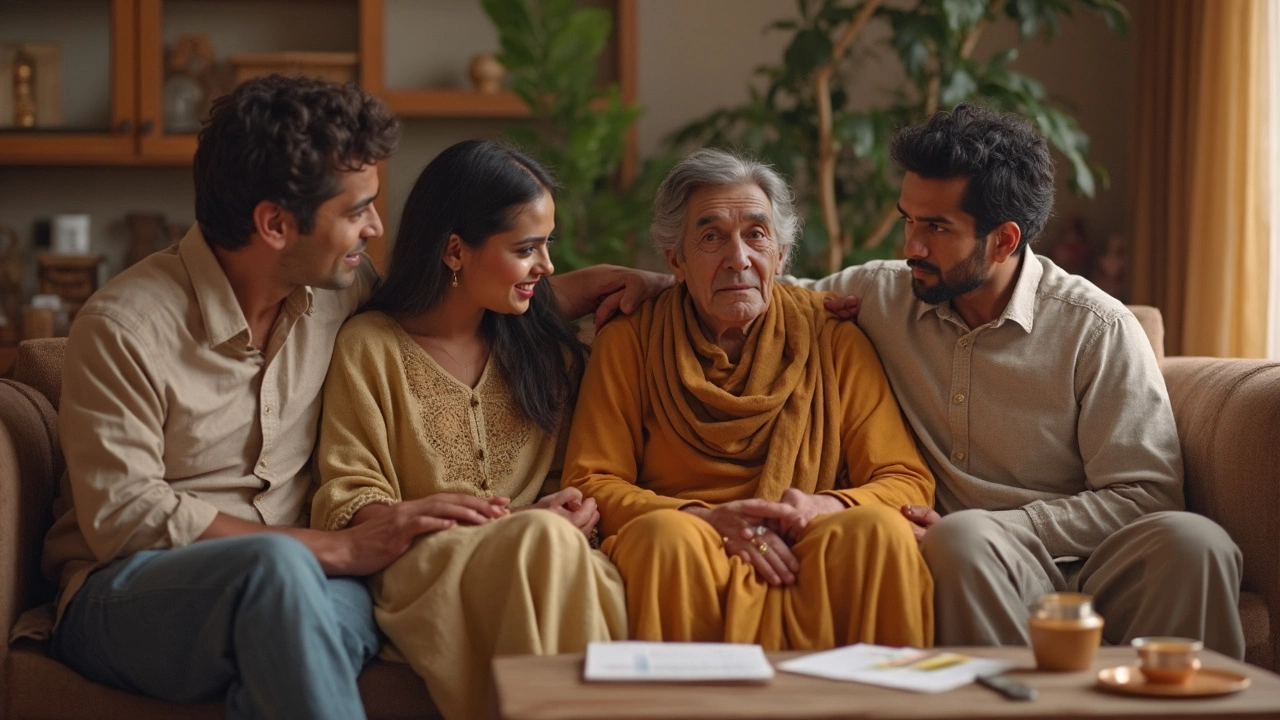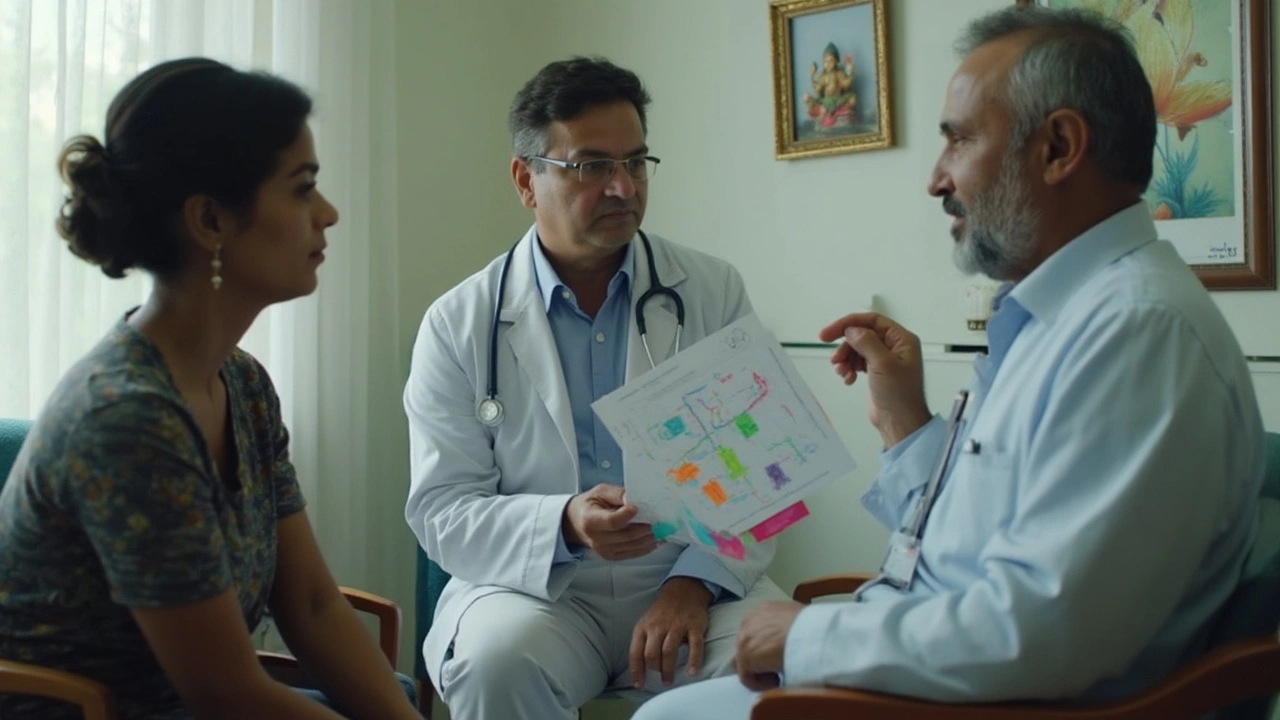
Does Stage 4 Mean Terminal? Cancer's Toughest Question Answered
Stage 4 cancer. Just hearing those words can feel like a punch to the gut. Most people think it means the end, but that's not the whole story. Stage 4 doesn't always mean 'terminal' — they aren't automatic twins. There's more to the picture and, honestly, sometimes the facts are a little brighter than the myths.
So what does 'stage 4' even mean? Doctors use it to describe cancer that's spread far from where it started. But here's the thing: 'terminal' is more about where someone is in their journey — when treatments stop working, and the focus turns entirely to comfort, not to cure. Plenty of folks with stage 4 cancer live for years. Treatments keep improving, and every person's cancer behaves a bit differently.
- Stage 4 vs. Terminal: Not Always the Same
- What Happens in Stage 4 Cancer
- Treatment: Is There Still Hope?
- Living with Stage 4: What’s Possible
- Stories and Stats that Might Surprise You
- Tips for Handling the Tough Moments
Stage 4 vs. Terminal: Not Always the Same
This is where people get confused. You hear 'stage 4,' and instantly think it means terminal. Actually, that's not how it works in medicine. Stage 4 is a label for how far the cancer has spread. Terminal is more about what treatment can or can't do at this point in someone’s life.
Stage 4 just means the cancer has moved beyond its starting place, usually to other organs or distant tissues. That could mean a few spots in the liver, lungs, or even bones, depending on the original cancer. It doesn’t mean doctors are out of options.
The word 'terminal' comes into play when doctors believe treatment will no longer stop or shrink the disease. Instead, the treatments switch to focusing on comfort and quality of life instead of trying to cure or control the cancer for the long run. Not every stage 4 case is terminal right away. Some folks respond to treatment and can live with their cancer as a chronic problem for years.
If you look at cases like some breast, prostate, or colon cancers, stage 4 might be managed for quite a long time. There are targeted treatments, immunotherapies, and sometimes even surgeries that help people live much longer than they could have ten years ago. Doctors may avoid calling something terminal until they really see that their toolbox is empty.
The bottom line? Stage 4 and terminal don't mean the same thing at all. If you're or someone you love is diagnosed with stage 4, it’s totally fair—and smart—to ask doctors exactly what it means for your specific case and what the goals of treatment truly are.
What Happens in Stage 4 Cancer
When doctors say something is stage 4 cancer, they mean the cancer cells have left their original home. They've traveled through the bloodstream or lymph system and set up shop in other parts of the body. For example, breast cancer that moves to the bones or lungs is still called breast cancer, but now it's stage 4 because it's spread (what the medical folks call "metastasized").
Not every stage 4 cancer acts the same. Some grow fast, others move like snails. And where it spreads makes a huge difference. For example, stage 4 prostate cancer often grows slowly and may not shorten someone’s life for years. But stage 4 pancreatic cancer usually spreads quickly and is more aggressive.
Here’s what usually happens in this stage:
- stage 4 cancer can show up in all sorts of places, but bones, liver, lungs, and brain are the top spots it likes to go.
- Symptoms can be wildly different, depending on where the cancer settles. You might see tiredness, weight loss, pain, or coughing — the list goes on.
- Treatment usually aims to shrink tumors, slow down the spread, or ease symptoms rather than cure the cancer completely.
The numbers show how different survival and life can look, depending on the type and location of stage 4 cancer. Here’s a quick snapshot:
| Type of Cancer | 5-Year Survival (Stage 4) |
|---|---|
| Breast | 31% |
| Prostate | 32% |
| Lung | 8% |
| Colorectal | 16% |
| Pancreatic | 3% |
That table might look scary, but remember: these are averages from large groups. Some people beat those odds by a lot, thanks to new drugs, trials, and sheer luck. And just because the cancer is advanced doesn't always mean you lose all control — there are always options for care, comfort, and in a few cases, real surprises.
Treatment: Is There Still Hope?
This is the big question on almost everybody’s mind right after “stage 4” shows up in the conversation. The short answer? Yes, there’s hope. Cancer care has come a long way in the last ten years, and stage 4 is not always the end of the road.
Here’s what’s actually out there for people dealing with advanced cancer:
- Targeted Therapy: These meds go after specific changes in cancer cells. They’re especially helpful in some cancers like lung, breast, and colon.
- Immunotherapy: This revs up your body’s own defenses to fight cancer, and it’s led to real breakthroughs for folks with cancers like melanoma or lung cancer.
- Chemotherapy: Traditional but still widely used, chemo can shrink tumors or slow things down, buying precious time and sometimes shrinking symptoms dramatically.
- Radiation: Not just to cure, but to ease pain or make things more manageable in everyday life, especially if cancer’s pressing on important areas.
- Clinical Trials: There’s a whole world of new treatments being tested, and many people at stage 4 get options through these trials that go way beyond the standard menu.
Real talk: not all treatments are about curing. Sometimes the goal is to give you more good days, fewer side effects, or just keep cancer from growing for as long as possible. Doctors use the term "palliative care" for that—treatment that boosts quality of life while also dealing with cancer itself.
Here’s how long people can live with stage 4, based on numbers from real research. It’s not exact and everyone’s situation is unique, but the table gives a sense of what’s possible today:
| Type of Cancer | Median Survival (Months) | 5-Year Survival Rate (%) |
|---|---|---|
| Breast | 36+ | 28 |
| Prostate | 55+ | 32 |
| Lung (NSCLC) | 9-14 | 8 |
| Colorectal | 24-30 | 14 |
| Melanoma | 24-36 | 25 |
Surprised by some of those numbers? Newer drugs keep bumping them up. Some people with stage 4 are out hiking, working, and living like anyone else, thanks to modern treatments catching cancer off guard.
A few quick tips if you or someone you love is facing treatment choices:
- Ask if genetic testing of the tumor could open up new options.
- Get a second opinion—there’s zero harm and it can open fresh doors.
- Look into palliative care early, not just when treatment stops, because it can mean way more comfort and support through the journey.
- Stay open to clinical trials—it’s where tomorrow’s breakthroughs show up first.

Living with Stage 4: What’s Possible
Hearing “stage 4 cancer” makes most people picture hospitals, IVs, and nothing but bad days. But let’s be real—the experience can be wider than that. Treatments for advanced cancer keep getting better, which means lots of folks with stage 4 are living longer and sometimes even doing regular things, like working, traveling, or just hanging out with family.
If your doctor says you have stage 4 cancer, life doesn’t stop. In fact, some cancers—like certain types of breast, prostate, or lymphoma—can stay under control for years with the right treatment. There are stories about people living five, ten years or even longer despite their diagnosis. No two people experience this the same way, so don’t let statistics become a personal script.
Daily life with advanced cancer is all about balance. Treatments might be ongoing, but lots of people fit them in without hitting pause on everything else. Managing energy, pain, and side effects becomes routine for many, kind of like how someone with diabetes manages their condition. Some folks even keep working, at least part-time, if they feel up to it. Others travel or take up new hobbies.
- Keep your medical team in the loop about your goals—maybe you want to go on a trip, or watch your kid graduate. They can help plan treatment around what matters to you.
- Support is huge. Whether it’s friends, family, or online groups, it’s easier when you don’t have to go through it alone.
- Stay active as much as you can. Regular walks, gentle yoga, or even gardening can boost your mood and keep your body feeling stronger.
- Ask about new treatments or trials. Medicines and therapies change fast, especially for stage 4 cases.
Yes, challenges will pop up, and some days might totally suck. But a lot is possible with the right support, know-how, and attitude. The story doesn’t have to be over—sometimes, it changes in ways you never saw coming.
Stories and Stats that Might Surprise You
Stage 4 gets all the bad press, but let’s talk real numbers and real people. Did you know that some cancers—like prostate and certain types of breast cancer—can stick around as stage 4 for years and still be kept in check with ongoing treatment? One well-documented case is that of a man with stage 4 prostate cancer who lived more than a decade thanks to new hormone therapies. That’s not rare these days—reliable studies have shown some people with stage 4 breast cancer are living five, ten, even fifteen extra years compared to survival rates from the early 2000s, all because of better meds.
Here’s something wild: in 2023, the National Cancer Institute reported the five-year survival rate for metastatic breast cancer had climbed to about 30%. That’s up from below 20% just a decade back. While it’s not exactly uplifting, it proves things are getting better. For stage 4 melanoma, new immunotherapies have helped boost some survival rates from just 15% to nearly 50% for certain groups—especially if the cancer carries specific mutations that doctors can target with drugs.
People’s stories matter just as much as the numbers. Some people with stage 4 colon cancer have managed to live cancer-free after aggressive surgeries and innovative treatments—these are cases documented in large hospital studies, not internet myths. Even with tough odds, many continue work, travel, raise families, and set new goals. They're not living like each day is their last; they’re finding ways to keep going.
- If you or someone you care about has been diagnosed, don’t assume the old statistics tell the full story. Ask about recent advances for stage 4 cancer.
- Get a second opinion, especially at centers that run clinical trials or have access to the newest therapies. Those places often offer options not available everywhere else.
- Keep up with real stories—support groups and online forums (like Smart Patients or Inspire) are packed with folks breaking the "rules" of the old stats.
The point? Stage 4 isn't a guarantee—it's a challenge. Stats tell part of the story, but everyday people keep showing us that even the toughest diagnosis isn't always the end of the road.
Tips for Handling the Tough Moments
When someone hears the words "stage 4 cancer," it's natural to feel overwhelmed. Honestly, there are days when hope feels slippery. But people get through it—even the really hard parts. Let’s talk about some practical ways to steady yourself and your loved ones when those tough moments hit.
- Connect with others: Almost every cancer center runs support groups, both in-person and online. A 2024 survey by the American Cancer Society found that people in peer groups reported a 22% lower rate of depression compared to those going it alone.
- Ask clear questions: Jot down what’s bugging you and bring the list to your doctor. There’s no such thing as a stupid question. If something's confusing about "stage 4" or side effects, make those nurses repeat it in plain English.
- Let yourself feel: Research from the Dana-Farber Cancer Institute shows that naming your emotions out loud with someone you trust actually helps people heal emotionally. It's not just a touchy-feely thing; it's a brain wiring thing.
- Practical planning helps: Have a folder for medications, appointments, and important phone numbers. When things get chaotic, this kind of setup saves a lot of headaches later.
- Self-care isn’t selfish: Sleep, eat, take short walks if you can. Even if you’re feeling lousy, small routines really boost mood—even something simple like listening to music or calling a friend.
- Lean hard on your care team: Palliative care isn’t just hospice. It’s about making sure you’re comfortable and have options, even while you’re getting treatment.
Sometimes, just seeing numbers can help people feel less alone. Here’s a quick look at what others facing stage 4 are experiencing right now:
| Action/Support | Reported Stress Reduction | Notes |
|---|---|---|
| Regular Support Group Attendance | 22% | ACS, 2024; reduced depression symptoms |
| Direct Communication With Doctors | 18% | Improved treatment satisfaction |
| Using an Organized Health Folder | 15% | Less confusion during emergencies |
| Daily Light Physical Activity | 20% | Boosts energy and mood; recommended by Mayo Clinic |
If you or someone you care about is dealing with stage 4 cancer, every bit of support, structure, and information helps. Keep talking. Keep reaching out. No one should have to shoulder the tough stuff alone.

Arnav Singh
I am a health expert with a focus on medicine-related topics in India. My work involves researching and writing articles that aim to inform and educate readers about health and wellness practices. I enjoy exploring the intersections of traditional and modern medicine and how they impact healthcare in the Indian context. Writing for various health magazines and platforms allows me to share my insights with a wider audience.
About
Medical Resource Center India is a comprehensive online platform dedicated to providing reliable health information and medical resources in India. Explore a wide range of articles, tips, and advice on medicine, healthcare services, and wellness. Stay informed about the latest developments in Indian medicine and access valuable insights into maintaining a healthy lifestyle. Discover expert guidance and health solutions tailored for every Indian citizen. Your go-to destination for authoritative medical knowledge in India.








